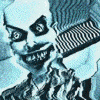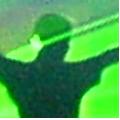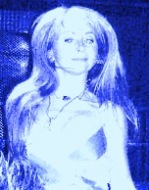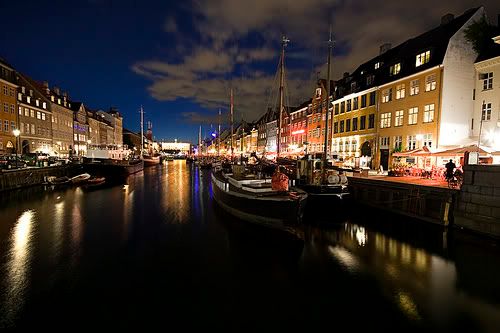Daily Star Trance Article
Moderator: MODs
23 posts
• Page 1 of 2 • 1, 2
i read it when I woke up today. Great acknowledgement. The best part is the general positive view that most DJs have when they leave our country. For someone like PVD to say Beirut was his favourite night (having probably done 200 nights in 2005) is WIKKID!
Are you ready to go on a musical trip with me, through love...happiness...music....AND PARTY TIME?
Nothing spells success like EXCESS!
Nothing spells success like EXCESS!
-

samlbronkowitz - Trance FrEaK

- Posts: 2082
- Joined: Tue Mar 07, 2006 1:30 pm
- Location: Beirut (heart)-Dubai (body)
Rave culture finds a happy home in Beirut
Hey all! Here's an article that was published on Saturday, June 24, 2006 in the Daily Star! It was written by TH's newest member, Addict! Enjoy, and tell us what you think!
Rave culture finds a happy home in Beirut
Top DJs and club-goers agree: Lebanon's capital has returned to the global party map
BEIRUT: Tiesto, Paul Van Dyk, Paul Oakenfold, Armin Van Buuren, Seb Fontaine, Anthony Pappa, Nick Warren, Tall Paul, John Digweed. Yes, it may sound like a poll for the best DJ in the world. But no, it is in fact a list of just a few names who have hit the Lebanese nightlife scene in the past year alone.
Summer - typically the season when the most music comes to town - is still young. But since New Year's Eve, there have already been 13 events in and around Beirut that qualify more or less as raves. With plenty more lined up for the coming months - including George Acosta, Judge Jules and Van Dyk - and high-profile DJs returning to Lebanon at a steadier rate, it seems the country has bagged itself a seat on the global rave circuit.
The term "rave" dates back to the 1960s. It came into common usage in the 1980s to refer to all-night, DJ-driven dance parties, usually illegal and organized through word-of-mouth, which grew out of the acid house and trance scenes in Chicago, New York and London. The term fell out of favor in the 1990s, only to be picked up again by a younger generation, which refers to raves interchangeably with club nights, regular parties and other one-time events, even if they are sponsored by, say, corporate interests or cultural institutions.
Beirut was once renowned for its nightlife and Western-style decadence, attracting wealthy Arab playboys in the disco days of the 1970s. But 15 years of civil war made most DJs apprehensive about coming to Lebanon for another decade or so.
Now, however, word is spreading that Beirut is once again a place to play.
"I had a fantastic time with a great crowd," said John Digweed after he played an event in February at the Warehouse, Mkalles. "The production was fantastic. I can't wait to be back and play again."
John Askew - who is returning to Lebanon for a gig with Van Dyk on July 8 - started it all when he headlined the Monot Music Festival in June 2002. It remains one of his favorite nights.
"Beirut was nuts," he says. "There were all these really dressed-up, sexy, affluent-looking clubbers going crazy and yet in every direction you looked there were buildings riddled with bullet holes. [I was] a little apprehensive, but it's an amazing place. Mental. Wicked party scene."
But he hasn't been back in four years - why?
"You know, that is a question that needs to be answered by the promoters in Lebanon - not me," he replies. "I would gladly come back and play in Beirut every month if I had the chance!
"The last time I was with Paul, he told me that his gig in Beirut last year was his favorite gig of 2005. When Paul Van Dyk says that, you know it has to have been something pretty special. Carl Cox said his gig over there recently was absolutely incredible. To be honest, every single DJ that plays in Lebanon always talks about how amazing it is. There is a real buzz around the global community about Beirut and its dance scene."
"The DJs really like it here," confirms Naji Cherabieh, director of Radio One, which organizes numerous such events a year. "The crowd gets really into it. At the last two raves that we had I saw an atmosphere I've never seen before. At Marco V, we probably had 2,000 people in complete harmony with the DJ. He was even telling me that, and that he's rarely seen the crowd act this way."
There is debate, though, as to whether this trend will continue.
"I think there was an increase two years ago," says Cherabieh, "and the peak was probably last year. This year, the way the trend is going, I think it's a mix between clubs and raves because people are more or less used to it now. There's a DJ every other week so it's no longer a novelty."
Ravers themselves, however, disagree.
"It's not true to say that the peak was last year," said Kareem Gharzedine, who went to his first rave in 2002 when Dave Seaman played at Strange Fruit, the previous occupant of the Starco Center space where Music Hall is now. "It was really good last summer, but this year more DJs are coming and more people are going to raves."
Jean Moukarzel, who has been going to raves since Anthony Pappa played at the Karantina club B018 in November 2002 (the first event to be organized by Radio One's competitor, Mix FM), agrees with Gharzedine.
"Educated people will still be there for sure. So too will the non-educated because they need a change from the superficial, materialistic nightlife in Lebanon," he says. "They need something rough, something real. I think it's still growing."
There are concerns, however, that the increase in raves brings a parallel increase in ecstasy use, as ecstasy has historically been the drug of choice for ravers. Amine Mallat, a psychotherapist at Skoun, a drug addiction and treatment center in Beirut, articulates this concern well.
"It began about five years ago and in the past two to three years there has been a very big amount of drugs coming into Lebanon," she says. "There are also ravers who chase rave parties around and bring in with them club drugs. There is now such a big amount that the price is really decreasing."
"Rave parties increase the use of ecstasy because they provide a venue in which to use," agrees Nadya Mikdashi, Skoun's prevention coordinator. "Beirut has become one of the major hubs on the electronic music scene. There are always these events going on."
The risk of ecstasy use is twofold. Experienced users develop a tolerance and take more, which means more ecstasy is around and more people are trying it for the first time.
"Regular ravers know not to drink alcohol with [ecstasy], for example," says Mallat. "But some new ravers don't know, which can lead to coma, seizures and even death."
Mikdashi is particularly perturbed by the lack of education about drugs in Lebanon.
"There is no open dialogue here even though everyone knows [what's happening]," she explains. At the same time, she says that curbing drug use should not be done through a crackdown on the events themselves.
"Raves are an expression of youth culture," she says. "It's all about young people wanting to listen to good music and have a good time. Electronic music has really found its place. Young people want and need a place to express themselves. We shouldn't forget that the youth in Lebanon are living in the same environment and suffering the same hardships as us adults. They need an outlet to let out steam and the raves give them this outlet."
Rave culture finds a happy home in Beirut
Top DJs and club-goers agree: Lebanon's capital has returned to the global party map
BEIRUT: Tiesto, Paul Van Dyk, Paul Oakenfold, Armin Van Buuren, Seb Fontaine, Anthony Pappa, Nick Warren, Tall Paul, John Digweed. Yes, it may sound like a poll for the best DJ in the world. But no, it is in fact a list of just a few names who have hit the Lebanese nightlife scene in the past year alone.
Summer - typically the season when the most music comes to town - is still young. But since New Year's Eve, there have already been 13 events in and around Beirut that qualify more or less as raves. With plenty more lined up for the coming months - including George Acosta, Judge Jules and Van Dyk - and high-profile DJs returning to Lebanon at a steadier rate, it seems the country has bagged itself a seat on the global rave circuit.
The term "rave" dates back to the 1960s. It came into common usage in the 1980s to refer to all-night, DJ-driven dance parties, usually illegal and organized through word-of-mouth, which grew out of the acid house and trance scenes in Chicago, New York and London. The term fell out of favor in the 1990s, only to be picked up again by a younger generation, which refers to raves interchangeably with club nights, regular parties and other one-time events, even if they are sponsored by, say, corporate interests or cultural institutions.
Beirut was once renowned for its nightlife and Western-style decadence, attracting wealthy Arab playboys in the disco days of the 1970s. But 15 years of civil war made most DJs apprehensive about coming to Lebanon for another decade or so.
Now, however, word is spreading that Beirut is once again a place to play.
"I had a fantastic time with a great crowd," said John Digweed after he played an event in February at the Warehouse, Mkalles. "The production was fantastic. I can't wait to be back and play again."
John Askew - who is returning to Lebanon for a gig with Van Dyk on July 8 - started it all when he headlined the Monot Music Festival in June 2002. It remains one of his favorite nights.
"Beirut was nuts," he says. "There were all these really dressed-up, sexy, affluent-looking clubbers going crazy and yet in every direction you looked there were buildings riddled with bullet holes. [I was] a little apprehensive, but it's an amazing place. Mental. Wicked party scene."
But he hasn't been back in four years - why?
"You know, that is a question that needs to be answered by the promoters in Lebanon - not me," he replies. "I would gladly come back and play in Beirut every month if I had the chance!
"The last time I was with Paul, he told me that his gig in Beirut last year was his favorite gig of 2005. When Paul Van Dyk says that, you know it has to have been something pretty special. Carl Cox said his gig over there recently was absolutely incredible. To be honest, every single DJ that plays in Lebanon always talks about how amazing it is. There is a real buzz around the global community about Beirut and its dance scene."
"The DJs really like it here," confirms Naji Cherabieh, director of Radio One, which organizes numerous such events a year. "The crowd gets really into it. At the last two raves that we had I saw an atmosphere I've never seen before. At Marco V, we probably had 2,000 people in complete harmony with the DJ. He was even telling me that, and that he's rarely seen the crowd act this way."
There is debate, though, as to whether this trend will continue.
"I think there was an increase two years ago," says Cherabieh, "and the peak was probably last year. This year, the way the trend is going, I think it's a mix between clubs and raves because people are more or less used to it now. There's a DJ every other week so it's no longer a novelty."
Ravers themselves, however, disagree.
"It's not true to say that the peak was last year," said Kareem Gharzedine, who went to his first rave in 2002 when Dave Seaman played at Strange Fruit, the previous occupant of the Starco Center space where Music Hall is now. "It was really good last summer, but this year more DJs are coming and more people are going to raves."
Jean Moukarzel, who has been going to raves since Anthony Pappa played at the Karantina club B018 in November 2002 (the first event to be organized by Radio One's competitor, Mix FM), agrees with Gharzedine.
"Educated people will still be there for sure. So too will the non-educated because they need a change from the superficial, materialistic nightlife in Lebanon," he says. "They need something rough, something real. I think it's still growing."
There are concerns, however, that the increase in raves brings a parallel increase in ecstasy use, as ecstasy has historically been the drug of choice for ravers. Amine Mallat, a psychotherapist at Skoun, a drug addiction and treatment center in Beirut, articulates this concern well.
"It began about five years ago and in the past two to three years there has been a very big amount of drugs coming into Lebanon," she says. "There are also ravers who chase rave parties around and bring in with them club drugs. There is now such a big amount that the price is really decreasing."
"Rave parties increase the use of ecstasy because they provide a venue in which to use," agrees Nadya Mikdashi, Skoun's prevention coordinator. "Beirut has become one of the major hubs on the electronic music scene. There are always these events going on."
The risk of ecstasy use is twofold. Experienced users develop a tolerance and take more, which means more ecstasy is around and more people are trying it for the first time.
"Regular ravers know not to drink alcohol with [ecstasy], for example," says Mallat. "But some new ravers don't know, which can lead to coma, seizures and even death."
Mikdashi is particularly perturbed by the lack of education about drugs in Lebanon.
"There is no open dialogue here even though everyone knows [what's happening]," she explains. At the same time, she says that curbing drug use should not be done through a crackdown on the events themselves.
"Raves are an expression of youth culture," she says. "It's all about young people wanting to listen to good music and have a good time. Electronic music has really found its place. Young people want and need a place to express themselves. We shouldn't forget that the youth in Lebanon are living in the same environment and suffering the same hardships as us adults. They need an outlet to let out steam and the raves give them this outlet."
Missing the Lebanese raves!!!
-

JayCM - Occasional Trancer

- Posts: 473
- Joined: Sun Jan 08, 2006 3:32 am
- Location: Paris
You said it all Addict ... every word u said is true ... Beirut is becoming more and more a scene that everyone will enny us sooon on it !!
" Rave culture finds a happy home in Beirut " with a happy family that will contribute in making beirut the best city in the world !!
" Rave culture finds a happy home in Beirut " with a happy family that will contribute in making beirut the best city in the world !!
Last edited by Moudy on Mon Jun 26, 2006 1:44 am, edited 1 time in total.
House Music Washes Away From The Soul The Dust of Everyday Life
♫ 124 ~ 128 ♫
djmoudy@hotmail.com
www.myspace.com/djmoudy
www.cloud9beirut.com Every Friday & Saturday [ Resident DJ ]
♫ 124 ~ 128 ♫
djmoudy@hotmail.com
www.myspace.com/djmoudy
www.cloud9beirut.com Every Friday & Saturday [ Resident DJ ]
-

Moudy - Certified Trancer

- Posts: 1441
- Joined: Mon Aug 30, 2004 9:58 pm
- Location: Cloud 9
Re: Rave culture finds a happy home in Beirut
Missing the Lebanese raves!!!
-

JayCM - Occasional Trancer

- Posts: 473
- Joined: Sun Jan 08, 2006 3:32 am
- Location: Paris
Are you ready to go on a musical trip with me, through love...happiness...music....AND PARTY TIME?
Nothing spells success like EXCESS!
Nothing spells success like EXCESS!
-

samlbronkowitz - Trance FrEaK

- Posts: 2082
- Joined: Tue Mar 07, 2006 1:30 pm
- Location: Beirut (heart)-Dubai (body)
What an amazing article!
It drew a Huge smile on my face really!!!
I liked what DJs say about Lebanon...Thx for this Addict
It drew a Huge smile on my face really!!!
I liked what DJs say about Lebanon...Thx for this Addict
-

Trancelvania - Certified Trancer

- Posts: 1226
- Joined: Tue Jan 03, 2006 1:20 am
- Location: Zalka - Beirut
Are you ready to go on a musical trip with me, through love...happiness...music....AND PARTY TIME?
Nothing spells success like EXCESS!
Nothing spells success like EXCESS!
-

samlbronkowitz - Trance FrEaK

- Posts: 2082
- Joined: Tue Mar 07, 2006 1:30 pm
- Location: Beirut (heart)-Dubai (body)
23 posts
• Page 1 of 2 • 1, 2
Who is online
Users browsing this forum: No registered users and 8 guests






